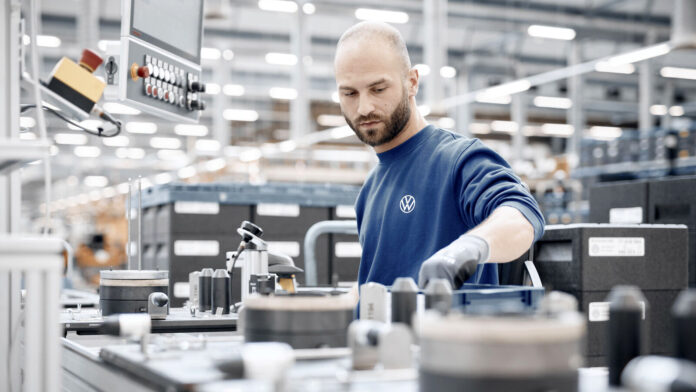Volkswagen will invest €1bn in AI by 2030 to transform vehicle development, production, and IT, targeting €4bn savings, 25% faster innovation cycles, digital sovereignty in Europe, and “AI everywhere” across its industrial value chain.
In sum – what to know:
Billion-dollar AI drive – VW targets “no process without AI” to transform design, production, logistics, and IT.
Bigger industrial gains – 1,200+ AI production apps deployed; €4bn savings and 25% faster production targeted.
Sovereignty and support – push for digital sovereignty in Europe; request for AI-friendly support and regulation.
German automaker Volkswagen Group is to invest €1 billion ($1.17bn) by 2030 in AI-related industrial technologies to boost vehicle development, industrial applications, and IT infrastructure. It made the announcement at the IAA Mobility trade fair in Munich this week, with an AI-rules kind of message about its future Industry 4.0 strategy: “no process without AI”, it said. The firm reckons it will save €4 billion by 2035 from efficiency gains and cost avoidance through “consistent and scalable use of AI” across its entire “value chain”.
Hauke Stars, member of the management board for IT at Volkswagen Group, said: “Wherever we see potential, we utilize AI in a targeted manner. Scalable, responsible, and with clear industrial benefits. Our ambition: AI everywhere, in every process.” The group is working with unnamed technology and industry partners to develop a domain-specific Industry 4.0 language model, a so-called Large Industry Model (LIM), which uses design, production, and sundry automotive process data from participating companies.
It stated: “Collective industrial process knowledge could be used to train an AI model that helps optimize internal workflows and enables more efficient logistics and process control across industries and for all participants.” An organizational blueprint for such an initiative, still in the “exploration” phase, might be the open Catena-X platform for the automotive sector and broader industrial value chain, it suggested. The Catena-X platform is designed to allow secure data exchange between manufacturers, suppliers, and other tech providers.
Volkswagen is a founding member, alongside BMW, BASF, Mercedes-Benz, SAP, Siemens, ZF, and T-Systems. In the end, its total strategy is to make vehicles better, and faster, and AI looks like the answer. Volkswagen claims to have 1,200 AI applications in production already, and “several hundred more” in development or implementation. It has a proprietary “factory cloud”, connecting more than 40 production sites across the group. “Volkswagen is continuously introducing new AI applications into its manufacturing processes,” it said.
Its centralised “factory cloud”, presented as a Digital Production Platform (DPP), is part of its group-wide private cloud infrastructure. This will be “significantly expanded” in the coming years, in line with its digital sovereignty play, and its hard line on resiliency “against external risks and influences”. It stated: “Technological independence and resilience begin with maintaining control over data – and that only works if data is stored, processed, and protected within Europe.” Sustainability, cybersecurity, and knowledge sharing are all part of its smarter production strategy.
In vehicle development, before its vehicles are connected to its “factory cloud” in its manufacturing sites, Volkswagen is working with Dassault Systèmes to build an “AI-powered engineering environment” to help engineers with virtual testing and component simulations across all its brands in all its markets. It wants to reduce its development cycle by around 12 months (25 percent) – to 36 months, “or less”.
But there was a political message in its address at IAA Mobility, as well: it wants support, in exchange for support. It stated: “Volkswagen is committed to actively shaping the future of AI in Europe and supporting political and economic frameworks at both national and European levels. In an increasingly challenging environment – marked by high energy prices, elevated location costs, and administrative complexity – the company sees a clear need to advance technological innovation in AI in Germany and Europe through political support.”
It wants “innovation-friendly frameworks in the global AI race”, it said. Stars said: “We support the innovation-friendly evolution of European regulation. In addition, targeted incentives are needed: We must make more of what we’re capable of. This includes, above all, funding programs that strengthen spin-offs from universities and research institutions and accelerate the transfer of scientific knowledge into market-ready applications.”
The company has a large-scale internal AI training programme in place, since last year, which has already trained 130,000 staff across all levels, in all its markets. As a footnote, a blog post to go with the news of its AI investment makes AI need humans – in charge of it, and also accepting of it. Hence all the training. It stated: “AI needs rules… That is why we act on the basis of ethical standards and European regulation. When it comes to sensitive personnel issues, for example, a human being will make the final decision. Always. The key to the success of AI is acceptance.”
Stars said: “With AI, we are igniting the next stage on our path to becoming the global automotive tech driver. AI is our key to greater speed, quality, and competitiveness – across the entire value chain, from vehicle development to production. Our ambition is to accelerate our development of attractive, innovative vehicles and bring them to our customers faster than ever before. To achieve this, we deploy AI with purpose: scalable, responsible, and with clear industrial benefits. Our ambition: no process without AI.”

